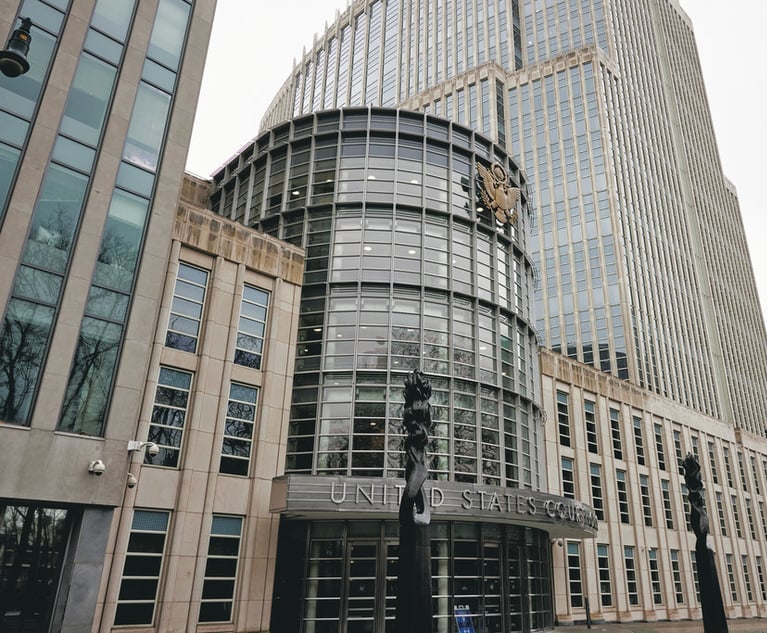 Lucy Fato, AIG general counsel
Lucy Fato, AIG general counsel50 Chief Legal Officers Seek More Rigorous Court Scrutiny of Expert Testimony
Fifty top legal officers of U.S. corporations sent a letter Monday urging the federal courts system to clarify a rule that sets standards for the use of expert testimony. The in-house counsel say courts too often are allowing juries to hear expert opinions. not based on scientific evidence.
March 02, 2020 at 06:14 PM
4 minute read
The original version of this story was published on Corporate Counsel
Fifty top lawyers of major corporations, including Big Pharma, Big Insurance and Big Tech, are urging the federal court system to clarify a rule of evidence that sets standards on expert testimony.
The lawyers, primarily chief legal officers and general counsel, sent a joint letter Monday to the Advisory Committee on Evidence Rules, which is looking at how federal courts address expert testimony and is exploring whether to amend the procedural rule, known as Rule 702.
Expert testimony is required when cases involve "scientific, technical or specialized knowledge" that falls outside the common experience of the jury. Problems arise for companies in cases such as the recent Roundup and talc cancer cases, where federal agencies ruled the products safe but plaintiffs' experts were allowed to testify otherwise.
The letter signers include Lucy Fato, executive vice president and general counsel of American International Group Inc.; Kent Walker, senior vice president, global affairs and chief legal officer of Google; Dev Stahlkopf, vice president and general counsel of Microsoft Corp.; and Doug Lankler, executive vice president and general counsel of Pfizer Inc. Several signers could not immediately be reached for comment.
The letter states, "Our experience indicates that adherence to Rule 702's standards for the admission of opinion testimony is far from acceptable."
Too often, the chief legal officers wrote, courts are "allowing juries a role in deciding whether an expert's opinions have the requisite scientific support."
The letter continues: "Confusion about the court's role in assessing foundational requirements results in the admission of unreliable opinion testimony that misleads juries, undermines civil justice, and erodes our stakeholders' confidence in the courts."
The letter also complains that some courts refer to a presumption of admissibility, which it calls "a mischaracterization that inverts the proponent's burden to establish the admissibility of expert testimony."
The top lawyers urged the committee to amend Rule 702 to clarify that:
- The proponent of an expert's testimony is responsible for establishing its admissibility.
- The proponent's responsibility requires demonstrating the sufficiency of the basis and reliability of the expert's methodology and its application.
- An expert shall not declare confidence in an opinion that is not derived from sufficient facts and reliable methods.
Rule 702 was drafted to give effect to the 1993 U.S. Supreme Court decision in Daubert v. Merrell Dow Pharmaceuticals, requiring standards for expert testimony. Amy Wilson, general counsel of Dow Inc., is one of the signers of the letter. As is Scott Partridge, general counsel of the U.S. operations of Bayer Corp., which now owns the oft-sued weedkiller Roundup.
Many of the chief legal officers are members of the Lawyers for Civil Justice, a nonprofit trade association made up of corporate counsel and their defense attorneys. The group, which focuses on the fairness, costs and efficiencies of the civil justice system, made the letter public.
Alex Dahl, general counsel of the Lawyers for Civil Justice, told Corporate Counsel that the timing of the letter was critical. The advisory committee has been studying Rule 702 for about two years and is "intending to decide whether to move forward with an amendment at the next meeting on May 8," Dahl explained.
He said the list of signers reflects a great diversity of industries. That such a diverse group would come together in one letter, he added, "demonstrates there is a pervasive problem with the standard."
Dahl said, "The standard is not being uniformly administered, and the courts are not executing their gatekeeping role as the rule envisioned."
This content has been archived. It is available through our partners, LexisNexis® and Bloomberg Law.
To view this content, please continue to their sites.
Not a Lexis Subscriber?
Subscribe Now
Not a Bloomberg Law Subscriber?
Subscribe Now
NOT FOR REPRINT
© 2025 ALM Global, LLC, All Rights Reserved. Request academic re-use from www.copyright.com. All other uses, submit a request to [email protected]. For more information visit Asset & Logo Licensing.
You Might Like
View All
Improper Removal to Fed. Court Leads to $100K Bill for Blue Cross Blue Shield

Texas Insurer Slaps Hinshaw & Culbertson With Legal Mal Claim Over $11 Million Personal Injury Jury Award
3 minute read
Insurer Not Required to Cover $29M Wrongful Death Judgment, Appeals Court Rules

Insurance Company Sues Over 180 Health Care Providers for Fraud Under RICO
3 minute readTrending Stories
- 1Decision of the Day: Uber Cannot Be Held Vicariously Liable for Driver's Alleged Negligent Conduct
- 2TikTok Law and TikTok Politics
- 3California Supreme Court Vacates Murder Conviction in Infant Abuse Case
- 4New York’s Proposed Legislation Restraining Transfer of Real Property
- 5Withers Hires Lawyers, Staff From LA Trusts and Estates Boutique
Who Got The Work
Michael G. Bongiorno, Andrew Scott Dulberg and Elizabeth E. Driscoll from Wilmer Cutler Pickering Hale and Dorr have stepped in to represent Symbotic Inc., an A.I.-enabled technology platform that focuses on increasing supply chain efficiency, and other defendants in a pending shareholder derivative lawsuit. The case, filed Oct. 2 in Massachusetts District Court by the Brown Law Firm on behalf of Stephen Austen, accuses certain officers and directors of misleading investors in regard to Symbotic's potential for margin growth by failing to disclose that the company was not equipped to timely deploy its systems or manage expenses through project delays. The case, assigned to U.S. District Judge Nathaniel M. Gorton, is 1:24-cv-12522, Austen v. Cohen et al.
Who Got The Work
Edmund Polubinski and Marie Killmond of Davis Polk & Wardwell have entered appearances for data platform software development company MongoDB and other defendants in a pending shareholder derivative lawsuit. The action, filed Oct. 7 in New York Southern District Court by the Brown Law Firm, accuses the company's directors and/or officers of falsely expressing confidence in the company’s restructuring of its sales incentive plan and downplaying the severity of decreases in its upfront commitments. The case is 1:24-cv-07594, Roy v. Ittycheria et al.
Who Got The Work
Amy O. Bruchs and Kurt F. Ellison of Michael Best & Friedrich have entered appearances for Epic Systems Corp. in a pending employment discrimination lawsuit. The suit was filed Sept. 7 in Wisconsin Western District Court by Levine Eisberner LLC and Siri & Glimstad on behalf of a project manager who claims that he was wrongfully terminated after applying for a religious exemption to the defendant's COVID-19 vaccine mandate. The case, assigned to U.S. Magistrate Judge Anita Marie Boor, is 3:24-cv-00630, Secker, Nathan v. Epic Systems Corporation.
Who Got The Work
David X. Sullivan, Thomas J. Finn and Gregory A. Hall from McCarter & English have entered appearances for Sunrun Installation Services in a pending civil rights lawsuit. The complaint was filed Sept. 4 in Connecticut District Court by attorney Robert M. Berke on behalf of former employee George Edward Steins, who was arrested and charged with employing an unregistered home improvement salesperson. The complaint alleges that had Sunrun informed the Connecticut Department of Consumer Protection that the plaintiff's employment had ended in 2017 and that he no longer held Sunrun's home improvement contractor license, he would not have been hit with charges, which were dismissed in May 2024. The case, assigned to U.S. District Judge Jeffrey A. Meyer, is 3:24-cv-01423, Steins v. Sunrun, Inc. et al.
Who Got The Work
Greenberg Traurig shareholder Joshua L. Raskin has entered an appearance for boohoo.com UK Ltd. in a pending patent infringement lawsuit. The suit, filed Sept. 3 in Texas Eastern District Court by Rozier Hardt McDonough on behalf of Alto Dynamics, asserts five patents related to an online shopping platform. The case, assigned to U.S. District Judge Rodney Gilstrap, is 2:24-cv-00719, Alto Dynamics, LLC v. boohoo.com UK Limited.
Featured Firms
Law Offices of Gary Martin Hays & Associates, P.C.
(470) 294-1674
Law Offices of Mark E. Salomone
(857) 444-6468
Smith & Hassler
(713) 739-1250








